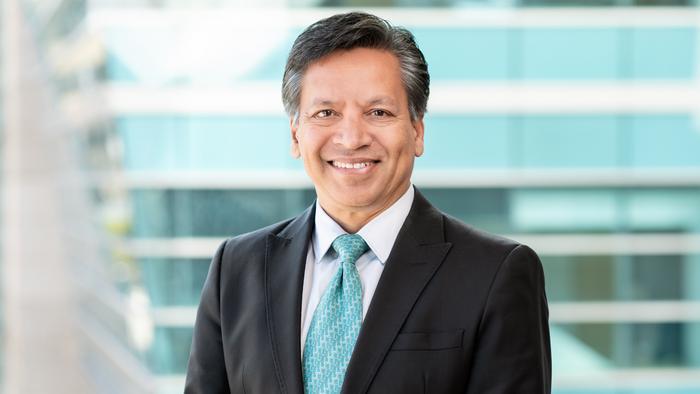
“I see a future where we’ll be using today’s advances in genetics, artificial intelligence, and other scientific fields to quickly identify and actually cure diseases,” Srivastava says. “It’s impossible to not be excited about this revolution in medicine, fueled by some of the brightest minds that I have had the privilege of working with. At Gladstone, this is the future we’re working toward, and I have never been more hopeful.” Image courtesy of Michael Short/Gladstone Institutes
November 14, 2023 — Deepak Srivastava, MD, president of Gladstone Institutes and a renowned cardiovascular researcher, took the stage on Saturday in Philadelphia to receive the American Heart Association’s Distinguished Scientist award—joining a preeminent group of scientists and clinicians who’ve earned the association’s highest honor over the past decade.
The American Heart Association applauded Srivastava for his significant, original, and sustained scientific contributions that have advanced the association’s mission: “To be a relentless force for a world of longer, healthier lives.”
“We live in an exponential phase of discovery and intervention for human disease, and I’m grateful to be able to contribute to this body of knowledge through my work as a scientist and as the leader of Gladstone Institutes,” says Srivastava, who also serves as a senior investigator at Gladstone and director of the institute’s Roddenberry Stem Cell Center. “I’m honored to receive the American Heart Association’s Distinguished Scientist award and stand among my fellow awardees who are redefining what’s possible in treating disease.”
In addition to his many leadership roles at Gladstone, Srivastava is a professor of Pediatrics and of Biochemistry & Biophysics at the UC San Francisco (UCSF) Medical Center. He holds the Robert W. and Linda Mahley Distinguished Professorship.
At Gladstone, Srivastava’s laboratory has led the way in understanding gene networks that guide development of the heart—and how changes in these pathways can lead to congenital heart disease. Through his many discoveries, he and his team have deciphered new ways to generate cardiac cells that repair heart damage and translated these findings into novel approaches for treating disease. Some of these discoveries are now in clinical trials.
“Deepak’s pioneering research has led to important breakthroughs that may one day help millions of patients every year, as congenital heart malformations continue to be the most common human birth defect and cardiovascular disease remains the world’s leading cause of death,“ says Benoit Bruneau, PhD, a Gladstone senior investigator and director of the Gladstone Institute of Cardiovascular Disease. “The heart is a vital organ, and that is why it is such a vital focus for us at Gladstone.”
Srivastava holds a BS from Rice University and an MD from University of Texas. He trained in pediatrics at UCSF and in pediatric cardiology at the Children’s Hospital of Harvard Medical School. Before joining Gladstone in 2005, Srivastava served as a professor in the Departments of Pediatrics and Molecular Biology at the University of Texas Southwestern Medical Center in Dallas. He is a former president of the International Society for Stem Cell Research and is a member of the American Society for Clinical Investigation, the American Academy of Arts and Sciences, the American Association for the Advancement of Science, and the National Academy of Medicine.
“I see a future where we’ll be using today’s advances in genetics, artificial intelligence, and other scientific fields to quickly identify and actually cure diseases,” Srivastava says. “It’s impossible to not be excited about this revolution in medicine, fueled by some of the brightest minds that I have had the privilege of working with. At Gladstone, this is the future we’re working toward, and I have never been more hopeful.”
The American Heart Association presented Srivastava and five other awardees with the Distinguished Scientist Award during its 2023 Scientific Sessions conference in Philadelphia, which marked the 10th year of the awards. With more than $5 billion invested in research, the association is the largest not-for-profit funding source for cardiovascular and cerebrovascular disease research, next to the federal government.
For more information: www.gladstone.ucsf.edu


 November 14, 2025
November 14, 2025 









